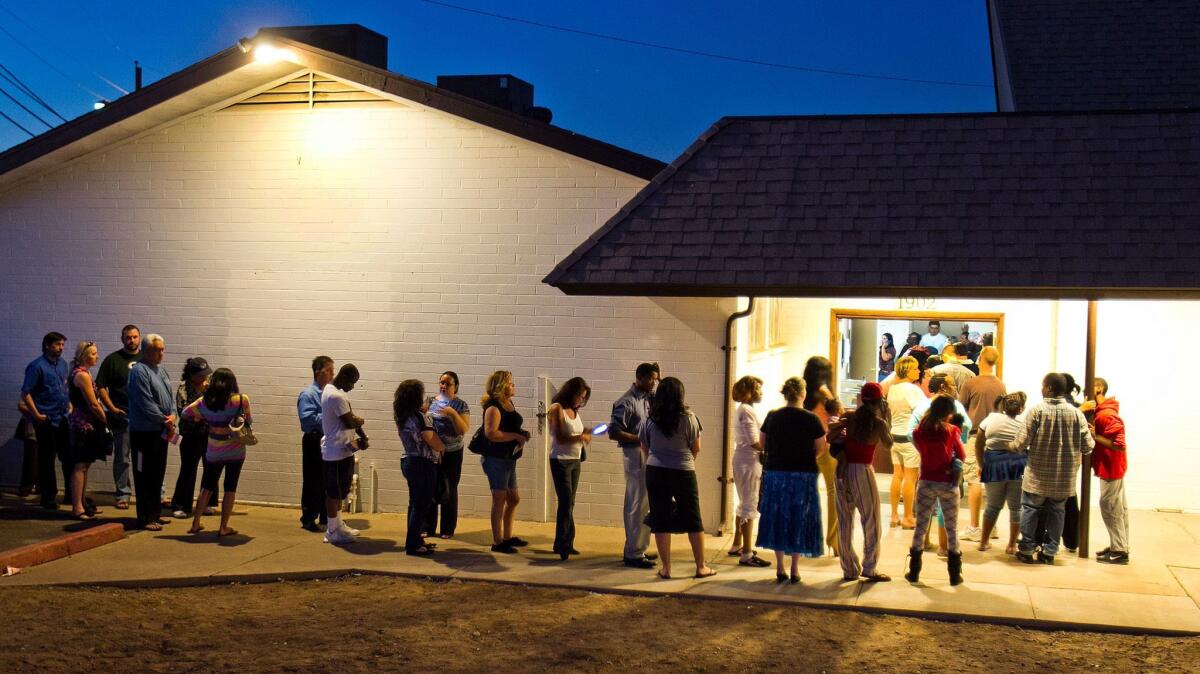Arizona has been accused of voter suppression before. A new registrar wants to change that reputation

- Share via
Reporting from Phoenix — To hear Adrian Fontes tell it, the hopes of thousands of would-be voters are trapped in dust-covered boxes at the Maricopa County Recorder’s Office.
The boxes are filled with forms reflecting failed attempts to register to vote. Fontes, the new Maricopa County recorder, says those failures are the result of a strict interpretation of registration rules, and he intends to do something about it.
For the record:
4:45 p.m. May 3, 2017An earlier version of this story said Maricopa County would not require proof of citizenship when people register to vote. Actually, if voter registration forms come in without proof of citizenship, the county will consult with Arizona’s Motor Vehicle Division to see if such proof is available.
Since 2004, Arizonans attempting to register to vote without showing proof of citizenship are put in a kind of voter purgatory, denied the right to vote as their county sends them reminders to confirm their citizenship.
But Fontes, a Democrat who in November defeated Helen Purcell, a Republican incumbent of nearly three decades, believes there are valid voters in those boxes, especially when the voter rolls are run against information held by the state Transportation Department Motor Vehicle Division, which has been requiring proof of citizenship for driver’s licenses for more than a decade.
If Fontes finds proof of citizenship at the Motor Vehicle Division, he said, he will register those voters.
“Where voters are treated differently with the government on one hand assisting voters and on the other hand preventing them from voting, that violates substantive due process, and there is no rational basis for it,” Fontes said.
Arizona is no stranger to claims of voter suppression. Hours-long lines plagued some of the most minority-heavy population centers in Phoenix during last year’s presidential primary after the state shuttered dozens of voting locations to cut costs.
“There’s nothing more political than voting, and that’s before you get to the ballot box,” said Joseph Garcia, Director of the Morrison Institute Latino Public Policy Center at Arizona State University.
Critics say Fontes is leaping a gap in Arizona election law, a step his counterparts in other Arizona county recorders’ offices have not taken, and one that seems to contradict a U.S. Supreme Court ruling from 2013 addressing Arizona election law.
Arizona voters passed Proposition 200 in 2004, a measure that required would-be voters to show proof of citizenship — an Arizona driver’s license issued after 1996, a passport, birth certificate, naturalization number or tribal card.
Proposition 200 inspired others like it around the country, and was challenged by advocates for civil liberties and immigration rights, as well as the state Democratic Party.
“This law was written with the hatred and malice of the SB 1070 days,” Fontes said, referring to Arizona’s strict immigration law.
Arizona lost in the Supreme Court in a 7-2 decision. But the high court’s ruling applied to federal voter-registration forms, which are only used about 5% of the time, according to Arizona filings in the case.
The great majority of forms used by prospective voters, about 95%, are state registration forms, which still require proof of citizenship.
Nevertheless, Fontes said Maricopa, the state’s largest county, will continue using state forms, and if the forms come in without proof of citizenship, the county will consult with the Motor Vehicle Division to see whether such proof is available. He disagrees that he is doing anything other than his duty to register voters, and says he is eager for a court challenge.
“What fool would be so brash as to challenge putting legal U.S. voters on the voting rolls?” he said.
After an initial review of the dusty boxes, Fontes said his staff found that 44,000 applicants later successfully registered on their own once they provided proof of citizenship.
“That’s 44,000 people who were probably denied the right to vote at least once,” Fontes said.
Fontes said he and his staff have given a preliminary look at 83,000 failed registration forms and plan to review them further.
In Kansas, a similar scenario over voter registration has played out with very different politics. Conservative Secretary of State Kris Kobach has argued in court that all voters who register without showing proof of citizenship must be placed on a “suspense” list, similar to the dusty boxes in Arizona.
“I have proof positive that U.S. voters were denied the right to vote,” Fontes said. His critics, he added, “are all saying it’s illegal; I’m saying they’re reading the law wrong.”
Follow Nigel Duara on Twitter: @nigelduara
ALSO
House approves $1-trillion bipartisan spending bill
Governor says Puerto Rico is headed to U.S. Bankruptcy Court
More to Read
Sign up for Essential California
The most important California stories and recommendations in your inbox every morning.
You may occasionally receive promotional content from the Los Angeles Times.











